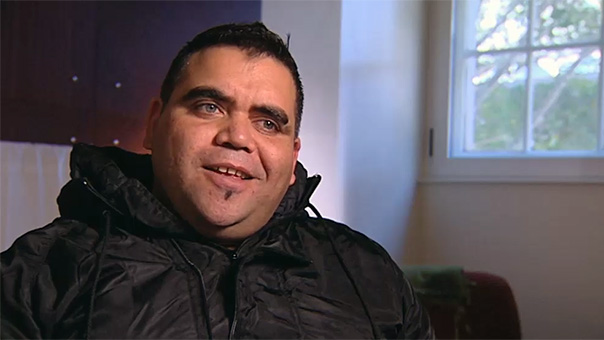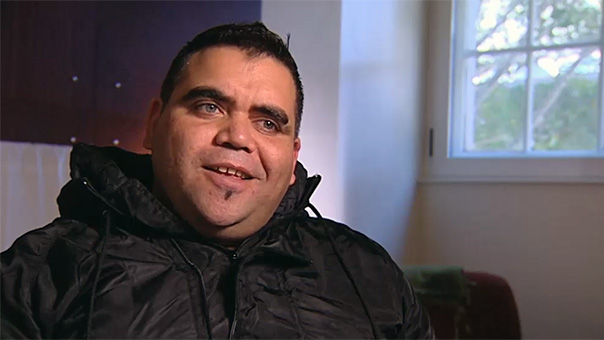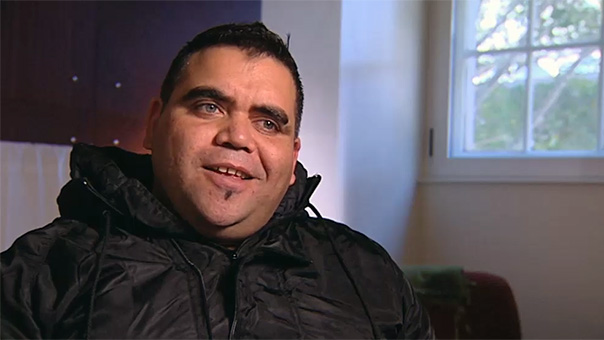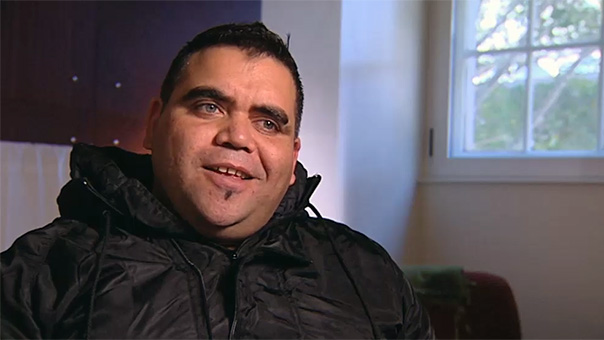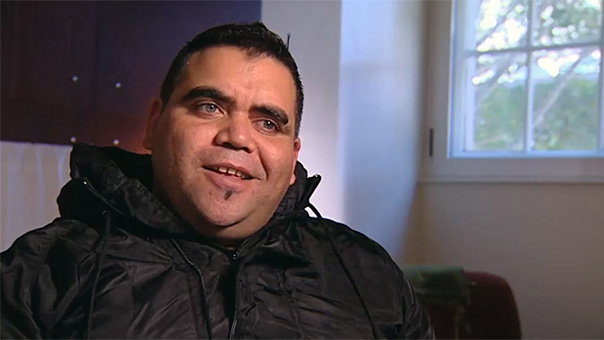1. Becoming a poet
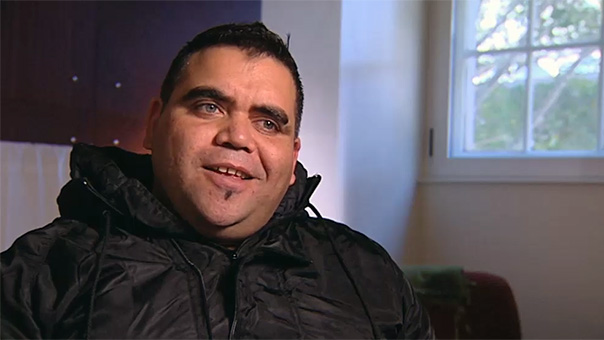
Viewing guide
Samuel Wagan Watson was interviewed as a part of the 2007 Sydney Writers’ Festival. The interview is broken into 6 videos. Samuel Wagan Watson is a poet with five published books and two major writing awards.
He was born in Brisbane in 1972 of mixed European and Aboriginal descent and has a variety of rich life experiences which form a backdrop to his work. Watson writes about his observations of the everyday world and about Aboriginal culture. His writing style is direct and unstructured, rarely using capital letters. Besides his parents, his major influences are musicians.
In between his international tours, Watson also mentors young people and presents workshops in schools.
Begin thinking about a topic that you could write poems on. You will be working on and developing one or more poems as you work though the videos.
-
Describe the experiences that started Samuel writing poetry.
-
Explain why Samuel chose poetry and not another form of expression.
-
List some political references and attitudes used in Samuel's work.
-
Explain what drove him to include them.
-
Discuss other poems or songs you know that have political messages.
-
Explain in what ways you find Samuel's influences and inspiration surprising?
-
Describe how a writer could be influenced by the place they came from.
-
Analyse how political messages are expressed in poems you have read?
-
Describe some aspects of a particular place that you could include in your own writing.
-
Describe where your inspiration for your own writing comes from.
-
Compare poetry with other forms of writing for the purpose of telling a story or sharing experiences.
This sequence of videos is an interactive resource for Stage 5 English. It assists students to develop knowledge and understanding about Indigenous cultures of Australia, New Zealand and the Pacific Islands. Students will respond to the poet, his texts, and others chosen by the teacher, as well as composing one or more of their own works.
In the videos Indigenous poet, Samuel Wagan Watson, describes how he became a poet, his inspiration and his influences. He talks about his disciplined work habits and describes the nature of his poetry. He gives advice to young aspiring writers. He also reads one of his early poems ‘The crooked men’ from his book ‘Smoke encrypted whispers’.
Structure of learning activities
Each video is accompanied by questions designed to encourage comprehension, stimulate reflection and then guide creative writing. Students can use some or all of the questions to guide written work or oral discussions. Students are instructed to brainstorm and draft creative writing throughout this resource, their written work should be collected into one place so that they can refer back to their earlier work as necessary.
Working through the resource in its entirety will result in students producing a number of poems and practising the draft and revision process for at least one major work.
Syllabus outcomes
-
effectively transfers knowledge, skills and understanding of language concepts into new and different contexts (EN5-4B)
-
thinks imaginatively, creatively, interpretively and critically about information and increasingly complex ideas and arguments to respond to and compose texts in a range of contexts (EN5-5C)
-
understands and evaluates the diverse ways texts can represent personal and public worlds (EN5-7D)
-
questions, challenges and evaluates cultural assumptions in texts and their effects on meaning (EN5-8D)
-
describe the factors that contribute to an Aboriginal person’s identity (AS5.1)
-
explain ways in which Aboriginal Peoples maintain their identity (AS5.2)
Using this unit for other outcomes
To create an extended unit of work, combine this resource with poems or books listed in the related links below. This resource can also be used to cover a range of learning outcomes from the following syllabuses:
Websites
-
Biography of Samuel Wagan Watson from ‘The 48th Poetry International Festival’
-
The Age: Book review (2002) ‘The sources of poetic power’
-
Jacket Magazine: Book review (2005) ‘This line is now connected - Smoke encrypted whispers’
-
ABC RN Earshot: article on Samuel Wagan Watson talking about his new book 'Love Poems and Death Threats'
-
National Museum of Australia: 70% Urban exhibition ‘Who you callin’ urban video'
-
ABC RN Earshot: Podcast Samuel Wagan Watson speaking at the 2015 Adelaide Writers Week
-
ABC RN Poetica: Podcast ‘On the Road (Part 2) Samuel Wagan Watson and Martin Harrison’
-
Overland Magazine: 'hotel bone' by Samuel Wagan Watson
-
Poetry Foundation: 'Booranga Wire Songs' by Samuel Wagan Watson
-
Poetry Foundation: 'A one ended boomerang' by Samuel Wagan Watson
-
Cordite Poetry Review: blog posts and musing by Samuel Wagan Watson
Books by Samuel Wagan Watson
-
Of muse, meandering and moonlight (1999).
-
Hotel bone (2001).
-
Itinerant blues (2002).
-
Smoke encrusted whispers (2004).
-
Three-legged dogs and other poems (2005).
Interviewer Renette Townsend (Indigenous Engagement and Quality Teaching).
Interviewer: Hello Samuel. Thank you for sharing your time and experience with us. I'm a Wiradjuri woman from western New South Wales. Could you tell us where you come from?
Samuel Wagan Watson: Well, I'm a Brisbane boy. I have Birri Gubba and Mununjali blood and also my mother's people are German. So yeah I have a mixture of cultures, which I use very well to bring out several different influences in my writing.
Interviewer: So Samuel how does one become a poet?
Samuel: By accident really. I set out to be a film maker, worked in the industry for years in Queensland: Brisbane and the Gold Coast. I wanted to write screenplays, but it was my poetry that was really picked up and yeah, it's been a ten year period now on solely working on poetry.
Interviewer: Did you start writing poems as a student?
Samuel: No, it was very limiting in Queensland what we were taught in schools about literature, especially writing. What we were taught about poetry in Queensland was that poetry had to rhyme. It had to be in classical form-like stanzas. I prefer to write prose, prose poetry that doesn't rhyme. It's more concentrating on telling a story and delivering a textual postcard to the reader.
Interviewer: Samuel, you've enjoyed a vast array of experiences in your life. How have they influenced your writing of your poems?
Samuel: Basically I think a good writer is one that has life experience. It's very hard I think to write in an academic kind of space, so yeah, most of my writing comes from life experience, the various jobs. I've been, I've done things from fraud investigator to steel fixer, security guard - all sorts of things. My poetry comes from little incidences I've either been in, or things I've witnessed. Growing up in a household of storytellers, journalists and writers it was something that just came natural.
Interviewer: Samuel, your father is a well known political activist. What role did he play in your writing?
Samuel: When I was a kid, especially, I became very politically aware. As a child, Saturday afternoons were a special time in our house. People from the labour movement in Queensland, people from the unions, black fellas and activists from the community would come over for these wonderful Saturday afternoon barbies. You'd sort of hear Joe Cocker and that playing in the background, Janis Joplin. And in the background were these really heavy political raps, and jokes, wonderful jokes. My dad and his mates, they were really good with timing. They'd deliver their punch lines so well. I just used to sit there like a fly on the wall and catch onto these conversations. I had a really healthy regime of Cheech and Chong albums when I was a kid and the simplicity of Cheech and Chong and Bill Cosby. Those comedians themselves came from similar urban backgrounds to my own. Their jokes revolved around communities like my own, that were not so much ghetto-ised but very much working class and I related to that really well. I surprise university lecturers quite often when I'm pulled into a university and they ask me - they expect my influences to be maybe, you know, Shakespeare or the great writers. But I'm like, 'No. It's Cheech and Chong and ACDC', that kind of, working class spokesperson.
All English and Aboriginal Studies syllabus outcomes referred to in this resource are copyright Board of Studies, Teaching and Educational Standards NSW 2017.
Banner image sources
Australian aboriginal geometric art (Natalyon | Shutterstock.com)
Aboriginal snake (Craig Sutton | Shutterstock.com)
